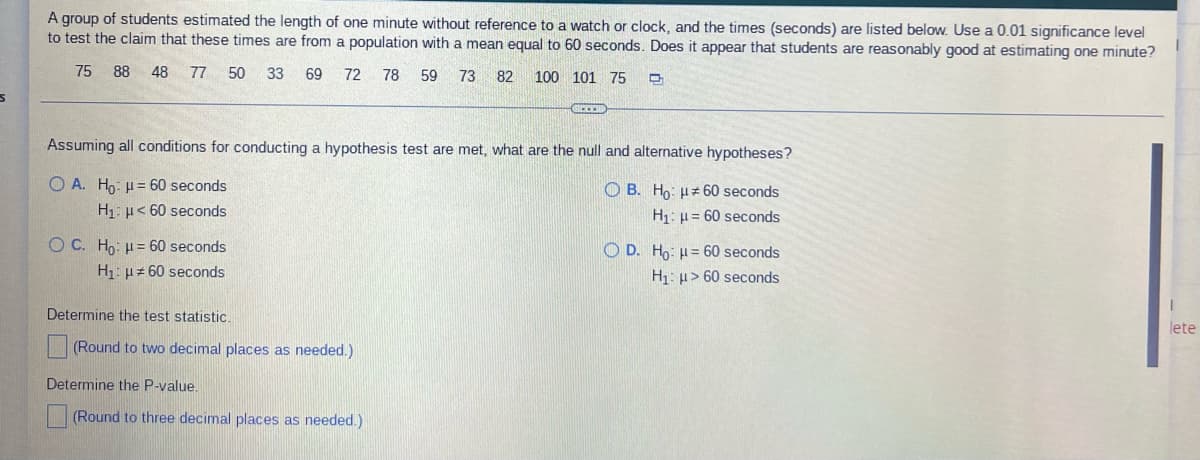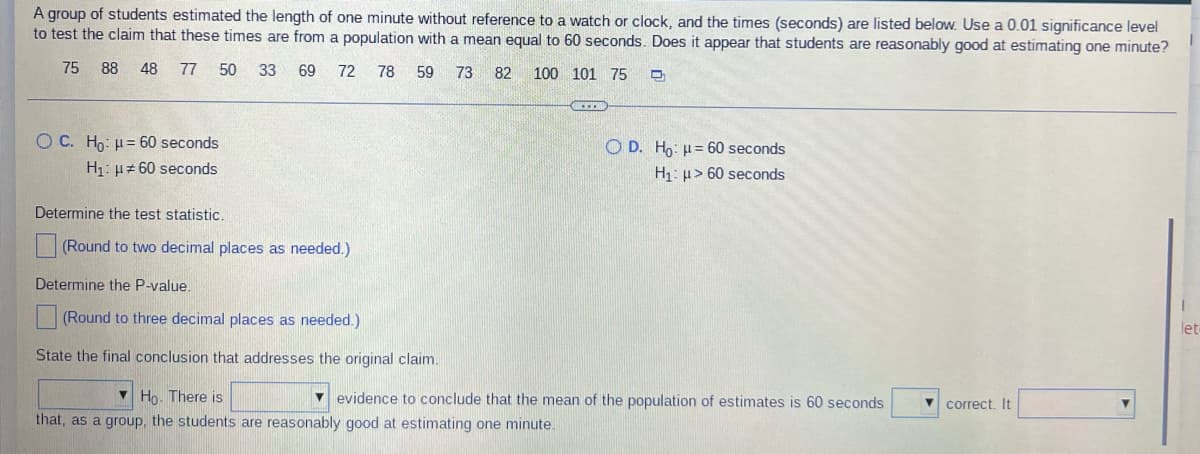88 Ho: H = 60 seconds H₁: #60 seconds ine the test statistic. und to two decimal places as needed.) ine the P-value. und to three decimal places as needed.) he final conclusion that addresses the original claim. Ho. There is s a group, the students are reasonably good at estimating one minute. 48 77 50 33 69 72 78 59 73 82 100 101 75 D C OD. Ho: H=60 seconds H₁: μ> 60 seconds evidence to conclude that the mean of the population of estimates is 60 seconds correct. It let
88 Ho: H = 60 seconds H₁: #60 seconds ine the test statistic. und to two decimal places as needed.) ine the P-value. und to three decimal places as needed.) he final conclusion that addresses the original claim. Ho. There is s a group, the students are reasonably good at estimating one minute. 48 77 50 33 69 72 78 59 73 82 100 101 75 D C OD. Ho: H=60 seconds H₁: μ> 60 seconds evidence to conclude that the mean of the population of estimates is 60 seconds correct. It let
MATLAB: An Introduction with Applications
6th Edition
ISBN:9781119256830
Author:Amos Gilat
Publisher:Amos Gilat
Chapter1: Starting With Matlab
Section: Chapter Questions
Problem 1P
Related questions
Question

Transcribed Image Text:A group of students estimated the length of one minute without reference to a watch or clock, and the times (seconds) are listed below. Use a 0.01 significance level
to test the claim that these times are from a population with a mean equal to 60 seconds. Does it appear that students are reasonably good at estimating one minute?
75
88 48 77 50 33 69 72
78 59
73 82 100 101 75 D
S
Assuming all conditions for conducting a hypothesis test are met, what are the null and alternative hypotheses?
O A. Ho: μ= 60 seconds
OB. Ho:
60 seconds
H₁ μ< 60 seconds
= 60 seconds
OC. Ho: H= 60 seconds
H₁
OD. Ho: H= 60 seconds
H₁: > 60 seconds
H₁: #60 seconds
Determine the test statistic.
lete
(Round to two decimal places as needed.)
Determine the P-value.
(Round to three decimal places as needed.)

Transcribed Image Text:A group of students estimated the length of one minute without reference to a watch or clock, and the times (seconds) are listed below. Use a 0.01 significance level
to test the claim that these times are from a population with a mean equal to 60 seconds. Does it appear that students are reasonably good at estimating one minute?
75
88 48 77 50 33 69
72 78 59 73 82
100
101 75 D
OC. Ho: H= 60 seconds
O D. Ho: H= 60 seconds
H₁: μ#60 seconds
H₁: > 60 seconds
Determine the test statistic.
(Round to two decimal places as needed.)
Determine the P-value.
(Round to three decimal places as needed.)
let
State the final conclusion that addresses the original claim.
Ho. There is
▾correct. It
evidence to conclude that the mean of the population of estimates is 60 seconds
that, as a group, the students are reasonably good at estimating one minute.
Expert Solution
This question has been solved!
Explore an expertly crafted, step-by-step solution for a thorough understanding of key concepts.
Step by step
Solved in 3 steps with 1 images

Recommended textbooks for you

MATLAB: An Introduction with Applications
Statistics
ISBN:
9781119256830
Author:
Amos Gilat
Publisher:
John Wiley & Sons Inc

Probability and Statistics for Engineering and th…
Statistics
ISBN:
9781305251809
Author:
Jay L. Devore
Publisher:
Cengage Learning

Statistics for The Behavioral Sciences (MindTap C…
Statistics
ISBN:
9781305504912
Author:
Frederick J Gravetter, Larry B. Wallnau
Publisher:
Cengage Learning

MATLAB: An Introduction with Applications
Statistics
ISBN:
9781119256830
Author:
Amos Gilat
Publisher:
John Wiley & Sons Inc

Probability and Statistics for Engineering and th…
Statistics
ISBN:
9781305251809
Author:
Jay L. Devore
Publisher:
Cengage Learning

Statistics for The Behavioral Sciences (MindTap C…
Statistics
ISBN:
9781305504912
Author:
Frederick J Gravetter, Larry B. Wallnau
Publisher:
Cengage Learning

Elementary Statistics: Picturing the World (7th E…
Statistics
ISBN:
9780134683416
Author:
Ron Larson, Betsy Farber
Publisher:
PEARSON

The Basic Practice of Statistics
Statistics
ISBN:
9781319042578
Author:
David S. Moore, William I. Notz, Michael A. Fligner
Publisher:
W. H. Freeman

Introduction to the Practice of Statistics
Statistics
ISBN:
9781319013387
Author:
David S. Moore, George P. McCabe, Bruce A. Craig
Publisher:
W. H. Freeman